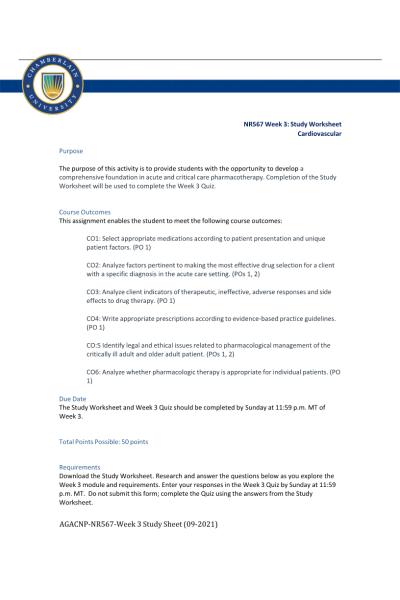NR 567 Week 3 Study Worksheet; Cardiovascular (All Correct Answers)
-
$20.00
| Institution | NR 567 Advanced Pharmacology for the Adult-Gerontology Acute Care Nurse |
| Contributor | Jaime Bradely |
NR567 Week 3: Study Worksheet Cardiovascular
Purpose
The purpose of this activity is to provide students with the opportunity to develop a comprehensive foundation in acute and critical care pharmacotherapy. Completion of the Study Worksheet will be used to complete the Week 3 Quiz.
Requirements
Download the Study Worksheet. Research and answer the questions below as you explore the Week 3 module and requirements. Enter your responses in the Week 3 Quiz by Sunday at 11:59 p.m. MT. Do not submit this form; complete the Quiz using the answers from the Study Worksheet.
Questions
- Your patient presents with essential hypertension, and in reviewing lab results, you note that the circulating plasma renin and catecholamine levels are high. You decide to lower blood pressure by reducing both cardiac output and systemic vascular resistance (blocking both alpha- and beta- adrenergic receptors) with a single pharmaceutical agent. Which of the following is most likely to achieve this goal?
- A nonselective beta-blocker was initiated for your patient. Which of the following diagnoses warrants initiating this pharmaceutical agent?
- You are managing a patient with a history of coronary artery disease and transient ischemic attacks. Low-dose aspirin treatment is considered, but the patient has a reported history of aspirin allergy. Which of the following is the best alternative?
- Which of the following adverse effects is likely when an angiotensin-converting enzyme inhibitor (ACEI) is used with spironolactone therapy?
- All of the following are beneficial effects of beta-blocker therapy for use in patients with cirrhosis except .
- Reducing cardiovascular events in patients with moderate to severe uncomplicated hypertension is an important consideration when choosing initial therapy. Which of the following is not recommended as a first-line treatment to reduce cardiovascular events?
- Which medication class would be most advantageous to use in treating a patient with hypertension and symptomatic benign prostatic hyperplasia (BPH)?
- A 49-year-old female is treated with unfractionated heparin post-myocardial infarction. The patient has developed several episodes of epistaxis, and now has + occult blood guaiac testing per digital rectal exam. Records reveal that she may have received an overdose of the anticoagulant. Which of the following will counteract the effects of heparin?
- You are considering using an ACE inhibitor to treat a patient with essential hypertension. Which of the following patient-related contraindications must be investigated and excluded before prescribing this medication?
- What is the most likely adverse response associated with aspirin for prophylaxis in patients with a high risk of atherosclerotic cardiovascular disease?
| Instituition / Term | |
| Term | Year 2022 |
| Institution | NR 567 Advanced Pharmacology for the Adult-Gerontology Acute Care Nurse |
| Contributor | Jaime Bradely |











